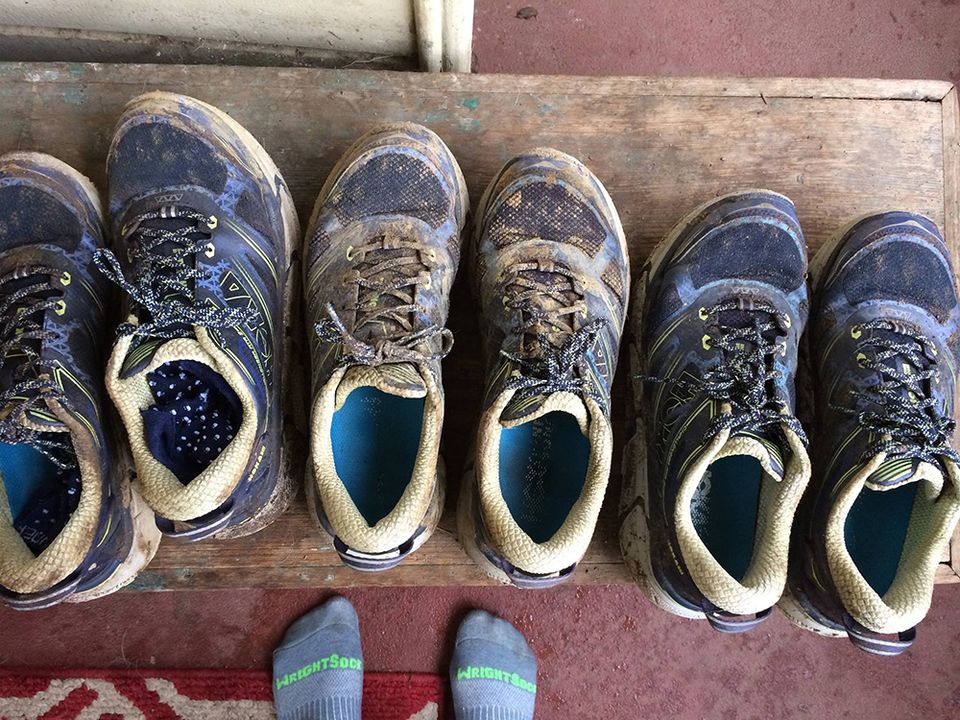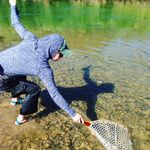 There are not many things that I have been doing for 30 years… breathing, eating, sleeping… and trail running. My dad was a runner, and one day I decided to join him and then I never stopped. Most of the time we ran on gravel roads or dirt paths. In college, though, I sought out smaller trails and continued to insist on dirt for running. In each new home and on every non-biking vacation, I have quickly figured out my trail options and while mountain biking has become the passion of all passions, trail running has always happened at least 2 days a week, sometimes as often as 5, and ramps up in the winter, when biking doesn’t work as well. I believe it is good for my bones, appreciate the simplicity, and actually enjoy it, and so it has stayed in the mix.
There are not many things that I have been doing for 30 years… breathing, eating, sleeping… and trail running. My dad was a runner, and one day I decided to join him and then I never stopped. Most of the time we ran on gravel roads or dirt paths. In college, though, I sought out smaller trails and continued to insist on dirt for running. In each new home and on every non-biking vacation, I have quickly figured out my trail options and while mountain biking has become the passion of all passions, trail running has always happened at least 2 days a week, sometimes as often as 5, and ramps up in the winter, when biking doesn’t work as well. I believe it is good for my bones, appreciate the simplicity, and actually enjoy it, and so it has stayed in the mix.

With winter coming (and now here) it seemed like a good idea to take my running up a notch, and to do so with some structure. I discovered Relentless Forward Progress, by Bryon Powell, a truly sensible and helpful book about ultrarunning. This is not surprising, as Powell is one of the folks behind irunfar.com, a great source for trail running gear reviews, strength training and injury prevention tips, and ultra-race info.
Powell has written a new book, with Meaghan Hicks (also a part of irunfar.com), Where the Road Ends: A Guide to Trail Running. How much is there to write about trail running? I figured this would be a thin volume with some infographics about rocks and maybe sections on trail running shoes and route finding, but this is a meaty book, densely packed with information and so many helpful tips.
Since I consider myself an experienced (if not ambitious) runner my inclination was to skip ahead to the parts that I might find more useful, but then those chapters kept referring back to previous chapters… and I wondered what I might be missing. So I started again, from the beginning.
My favorite thing about this book is the true enthusiasm for running that these authors have. They offer tips on running over logs and through streams and then remind us that “trail running is your dance with nature.” After going through all the potential gear that might come in handy (backpacks, lights, GPS, frictionless socks) they remind us that it “isn’t rocket science” and to “get out there!” My takeaway is that yes, there are techniques and things to consider with trail running but don’t get bogged down, because running is awesome! Plus I learned a new word! ”Rockstackle” which is so wonderful and obvious I can’t believe I never heard it before.
My second favorite thing about this book is the level of experience that the authors clearly have, and how generous they are with their knowledge. There are drills to improve speed, thoughts on descending more quickly, instructions for how and where to bury your poop, as well as highlights of epic trails around the world worth vacationing for. Lots of these things were not new to me, but there was much that was. I have been extremely consistent but casual in my running life, and now I realize how much more I could be doing and have been given the tools to do so (but “whatever you do, enjoy the run!”).

The authors live in Moab, Utah, a town where I lived for a time, and I recognized many of the trails in the photos. That was my third favorite thing about the book. Moab can make you into a seriously badass runner: many of the trails are very technical, the weather is intense, the plants are prickly, and there is a lot of terrain to get lost in. One day I was out on a mountain biking trail (mountain biking) with some friends and we were sessioning a tricky section on a trail called Captain Ahab: a short drop with a slot and a turn. Rideable, but intimidating. As we were talking about it, a compact, shirtless runner came charging down the trail and floated over the obstacles like they were invisible. He never slowed, didn’t hesitate, and even smiled a quick hello. After we picked our jaws up off the rocks, we realized that he was running the way we should be riding. Pick a line and go. I still have no idea how to do this as a runner, at that speed and on that technical a trail, but I now know it can be done. And this book has given me a lot of insight on what to work on.
If you have any ambition as a trail runner, or just enjoy running on trails and want to be a little more confident, this book is an amazing resource. I’ve been running for 30 years and still have a lot to learn. There is so much info packed into this book, it really serves an essential reference on trail running, or a text book for super-stoker beginners.



